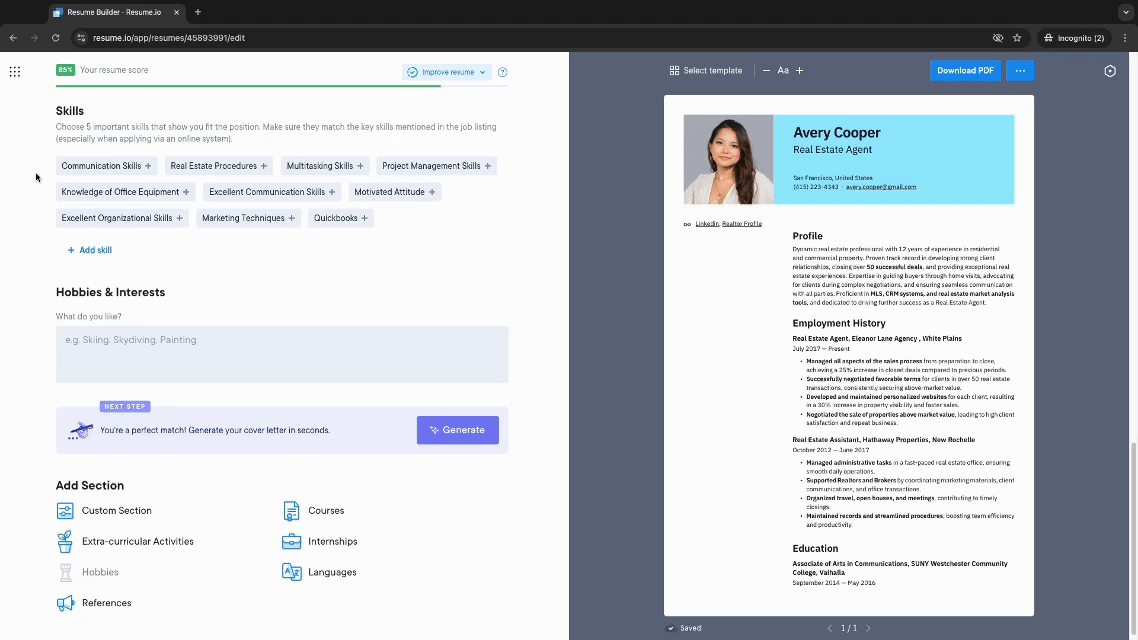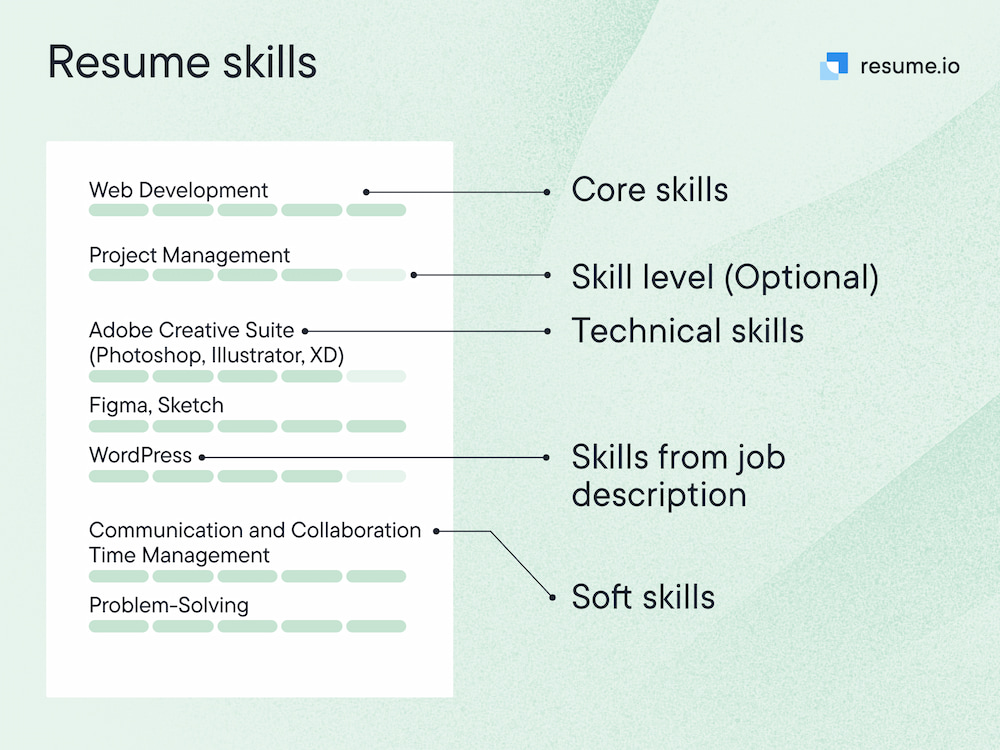Your next role will undoubtedly differ from your previous work experience. Therefore, while telling stories of your accomplishments will hint at your potential, sharing your broader skill set will be equally impactful.
When you talk about a skill on your resume, it does not need to be linked to a recent accomplishment. Of course, that is the ideal scenario, but there are plenty of skills that may have been dormant for a while. Mentioning a skill on a resume is an invitation to a hiring manager to explore it if they wish. You never quite know what menu of skills they envisage for a role, so make sure that you have a story or two up your sleeve.
In this blog, we explore the different aspects of including skills on your resume:
- Why are resume skills so important?
- Where do you include your skills on a resume?
- 125+ examples of hard skills
- 125+ examples of soft skills
Why are resume skills so important?
While work experience is the most important quality to showcase on a resume, your professional skills come a close second.
You may possess a wide skill set well beyond what you can mention in the work experience section. One-word descriptions of your skills may not offer much detail, but they could prove to be the springboard for fascinating interview conversations.
While you should never include professional skills without proficiency, there may well be skills that have been underused through no fault of your own. If your previous role did not call for a certain skill, it does not mean that it won’t be useful for your next job. In tailoring your resume for the specific job application, include any possible skills that could fit the future role.
Where do you include professional skills on a resume?
Your professional skills should be featured throughout the document. There are, however, three main places to place them with slightly different functions.
The skills section

The skills section is the place to include your technical and hard skills that may not find an obvious place in the work experience section. It is not easy to include these skills in an accomplishment bullet point, so including them in the skills section is their natural home.
Whatever you do, do not include basic skills here. The sort of skills that everyone at your level in your industry possesses are a waste of space in the skills section. Obscure skills that you can back up with an interesting story are what will make a hiring manager want to have a chat with you.
There are people who believe that you need to list every skill in the job description for the purposes of being “selected” by the recruitment CRM, but that is not the case. If your resume is a close fit, you can be sure that the hiring manager will scan it. They will want to see a skills section that brims with ambition and promise.

The work experience section
As mentioned, many hiring managers will read between the lines of the work experience section to discern your skills. Having said this, if you do have a rare skill that contributed to a particularly impressive achievement, it is relevant to include it. If a hiring manager is wondering how on earth you made something happen, let them know about it.
Try to avoid including lists of one-word skills in this section. The focus here should be detailed descriptions of your accomplishments, not meaningless lists. A bullet-point that does not hit hard with a quantifiable and relevant accomplishment is a waste of space in this crucial section.
The summary
It may be the case that one or two of your skills are so unique and central to the role that you feel that they are worthy of a spot in the career summary at the top of your resume. This is a brave decision as you need to be certain that hiring managers will be impressed by them. Only pick the types of skills that you are confident few others can boast.
Your summary should contain a mix of achievements, career ambitions and personal motivations alongside your skill set, so find the right balance for your situation.
125+ examples of hard skills
Hard and technical skills are those that you can learn and improve as you progress throughout your career. They are specific, teachable abilities that can be quantified, often acquired through formal education, training, certifications, or on-the-job experiences.
Technical skills
Technical skills involve software, hardware, and technical applications. They are increasingly important in many careers as technology becomes central to progress in many industries.
- Software development, web development, mobile applications, user interface design, UX design, information architecture, machine learning, data analysis, cloud computing, DevOps, cybersecurity, systems administration, network architecture, IT troubleshooting, IT project management, hardware development, software testing, database management
Design & creative skills
Creating concepts and visualizing solutions is at the heart of innovative thinking. Someone with a mastery of creative techniques can provide inspiration for their employers.
- Graphic design, Photoshop, Illustrator, InDesign, Sketch, Figma, video editing, animation, motion graphics, photography, 3D modeling, CAD, illustration, storyboarding, art direction, branding, typography, color theory, print design, web design
Data analysis & management skills
Data-driven evidence is central to sound decision making. The ability to use tools to collect, process and interpret data drives critical thinking and gives leaders confidence in outcomes.
- Data mining, data modeling, SQL, Python, Tableau, Power BI, Google analytics, predictive modeling, big data, regression analysis, data visualization, quantitative analysis, SAS, data management, database design, statistics
Marketing & sales skills
Understanding your target audience allows for targeted communication to sell products and services. Such engagement leverages marketing insight and drives business objectives.
- SEO, SEM, social media marketing, content marketing, email marketing, CRM, market research, brand marketing, direct sales, product management, sales strategy, advertising, event planning, public relations, copywriting, media planning, affiliate marketing
Scientific & research skills
The pursuit of knowledge through experimentation is central to many scientific careers. Observing, analyzing, and interpreting data can lead to ground-breaking results.
- Experimental design, lab safety, biostatistics, clinical trials, microscopy, genetic engineering, environmental testing, molecular biology, organic chemistry, bioinformatics, genome analysis, field research, lab management, scientific presentation
Finance & accounting skills
Understanding how to spend and invest your financial resources is a make-or-break activity for any business. Fiscal responsibility is the foundation of business growth.
- Budgeting, cost accounting, tax preparation, bookkeeping, QuickBooks, financial modeling, SAP, investment analysis, auditing, business valuation, debt restructuring, cost reduction, accounts payable/receivable, GAAP, corporate finance
Manufacturing & engineering skills
The ability to design an efficient and high-quality production process is key to delighting consumers. Manufacturing will continue to be a bedrock of our product-led society.
- Lean manufacturing, quality control, AutoCAD, SolidWorks, supply chain management, process engineering, materials engineering, industrial engineering, Six Sigma, mechanical design, electrical engineering, robotics, production scheduling, safety management
125+ examples of soft skills
Soft skills are the people-oriented behavioral skills that help to make things happen when you are working with others. Very few roles exist in a vacuum these days, so most employers will look for evidence of different soft skills.
Communication skills
Communication skills revolve around conveying the right message across different media to achieve the desired objective. Effective communication is key to a well-run business.
- Verbal communication, written communication, active listening, presentation skills, public speaking, storytelling, negotiation, conflict resolution, persuasion, interviewing, facilitation, feedback, empathy, assertiveness, patience
Teamwork skills
Working with a group of people with diverse perspectives to achieve a common goal is always going to be a challenge. Teamwork is the key to productivity and achievement.
- Team building, collaboration, constructive criticism, peer-to-peer collaboration, mediation, networking, stakeholder management, diplomacy, conflict management, group facilitation, cross-cultural communication, partnering, relationship building, mentoring, delegation
Management skills
Leading means organizing and optimizing resources, fostering a great working environment, and making sure that everyone in the team is looking in the same direction.
- Leadership, strategic planning, project management, delegation, decision making, change management, risk management, resource allocation, personnel management, coaching, business development, performance management, strategy, vision, succession planning
Problem solving skills
Identifying and devising solutions for problems is a skill that ensures progress and learning for you and for those around you. Problem solvers create a positive ripple effect.
- Critical thinking, analytical thinking, creativity, decision making, adaptability, initiative, innovation, resourcefulness, troubleshooting, root cause analysis, risk assessment, judgment, lateral thinking, diagnostic skills, scenario planning, data interpretation
Innovation skills
Driving change requires the ability to create and implement innovative ideas that challenge existing norms. This demands courage and a willingness to rewrite the script.
- Idea generation, artistic ability, brainstorming, problem solving, creative writing, visualization, concept development, design thinking, curiosity, open-mindedness, originality, invention, aesthetics, creative problem-solving, out-of-the-box thinking, risk taking
Organizational skills
The ability to plan and coordinate complicated tasks and projects is essential to ensure continued success. Planning how to achieve any given objective is a superpower.
- Time management, prioritization, planning, multitasking, project management, event planning, efficiency, record keeping, process improvement, attention to detail, scheduling, resource management, workflow management, delegation, goal setting, task management, quality control, performance measurement, deadlines management, inventory control
Key takeaways
- Resume skills are an essential inclusion in the content of your career story.
- Include them in the skills section, with work experience, or in the summary.
- Pick the most impressive skills – consider omitting the mundane ones.
- Tailor the resume to make sure that you talk about the skills that matter.
- Make sure that you have a story to accompany each skill that you include.





